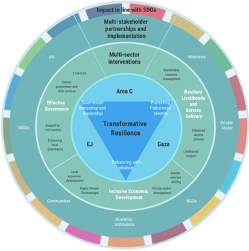Coronavirus Disease | COVID-19

Palestinian farmer, dressed in full protective gear including masks and latex gloves due to the COVID-19 coronavirus pandemic,northern Gaza City. © Mohammed Zanoon
The COVID-19 pandemic has led to large-scale emergencies across the globe, representing not only a global public health crisis, but also a humanitarian and development crisis. Beyond the immediate impact on people’s lives, health systems and economies, the pandemic threatens to profoundly deepen inequalities and reverse progress on the Sustainable Development Goals.
Given the scale and scope of the socio-economic impact of COVID-19, additional investments need to be made to complement the UN’s health and humanitarian response. Working under the convening power of the Resident Coordinator’s office, UNDP has been designated the technical lead in the UN socio-economic response, and is supporting the delivery of a strong UN Response.
COVID-19 in the State of Palestine
Already suffering from protracted conflict, restricted access to national resources, geographic fragmentation and intra-Palestinian divide, and decades of occupation, the implications of the COVID-19 pandemic and subsequent economic crisis on the State of Palestine will deepen vulnerabilities and drive additional households into poverty, especially those surviving on income in informal sector. The deteriorating fiscal sustainability will have a serious impact on the ability to ensure social safety networks are sustained, including cash transfers to vulnerable households and the salaries and pensions of government workers, including front-line health workers. More than 70 percent of households in Gaza, and 10 percent of households in the West Bank, depend on cash and in-kind assistance, and 21 percent of the Palestinian labour force works in the public sector, including 43 percent of employed women. The Palestinian economy is expected to incur losses of about US$2.5 billion three months into the COVID-19 pandemic. The Palestinian Central Bureau of Statistics estimates that a one-month shutdown would lead to a decline in Gross Domestic Product (GDP) of 1.2 percent compared to 2019, while a three-month shutdown and a six-month shutdown would lead to contractions of 5.1 percent and 7.1 percent, respectively. Thus, it is predicted that the GDP will decline by 14 percent in 2020 compared to 2019.
There is also a gender dimension for the crisis. Because of pre-existing gender-based inequalities, the crisis creates risks to further exclude and discriminate. Women and youth will likely experience more difficulty finding new jobs or entrepreneurship opportunities for their economic recovery, not to mention that women are increasingly shouldering unpaid care work, including child care, caring for the sick and home schooling. This would also contribute to the decline in women’s participation in the labour force and market.
Transformative Resilience Approach to Prepare, Respond and Recover

UNDP/PAPP’s approach is firmly nestled within the overall UNDP’s programmatic framework of ‘Transformative Resilience’, which places national ownership and leadership, self-reliance, and Palestinian identity at its core. The interventions envisioned under the COVID-19 Prepare, Respond and Recover approach is well aligned with UNDP’s programmatic focus: responsive and inclusive governance to increase access to quality basic services, public goods and rights; access to sustainable and inclusive economic opportunities; and climate change adaptation / mitigation and disaster risk reduction, sustainable use of natural resources and energy.
The transformative resilience approach through these pillars entails operationalizing the humanitarian-development (H-D) nexus on the ground through comprehensive and targeted interventions that address the multidimensional needs of vulnerable households, communities and institutions and ensures that no one is left behind. Overall, UNDP’s response aims to protect and support people and preserve the gains across all SDGs by keeping an eye on the 2030 Agenda for Sustainable Development and its core focus of ‘leaving no one behind’.
Although the Palestinian government’s pre-emptive containment measures have contributed to preventing a rapid outbreak , the potential socio-economic repercussions are as important to mitigate alongside protecting public health. As such, UNDP is supporting the Palestinian government across three main pillars:
Partnering for an Integrated Response

©UNDP/PAPP – Ahed Izhiman
As a critical player and the technical leader on the overall UN socio-economic response to the pandemic, we collaborate closely with the UN Resident Coordinator’s office and UN Country Team to support an integrated UN response to COVID-19, via the biweekly COVID-19 taskforce, the humanitarian cluster coordination system, the SDG and UN operations task forces which UNDP chairs.
UNDP is working with the Palestinian government, through the Prime Minister’s Office, to ensure our actions continue to strengthen the capacities of line ministries to maintain core functions, and to plan, coordinate, communicate and finance socio-economic recovery responses that meet the needs of the Palestinian people. UNDP is also engaging with its funding partners, private sector and civil society organizations as well as universities / start-up incubators to solicit innovative solutions, reduce misinformation, provide academic counselling and enhance e-learning.
The total funding requirement for UNDP's response is US$82,645,557, US$8,716,452 are available from activities in ongoing projects and additional resources, with a gap of US$73,929,105.
The UNDP COVID-19 programme will be implemented for a duration of 6 to 12 months, pending unforeseen evolutions in the pandemic.
| OUTPUT |
BUDGET | AVAILABLE | GAP |
| Prepare | $14,288,577 | $3,256,072 | $11,032,505 |
| Respond | $5,513,220 | $250,000 | $5,263,220 |
| Recover | $62,843,760 | $5,210,380 | $57,633,380 |
| Total |
$82,645,557 | $8,716,452 | $73,929,105 |

 Locations
Locations